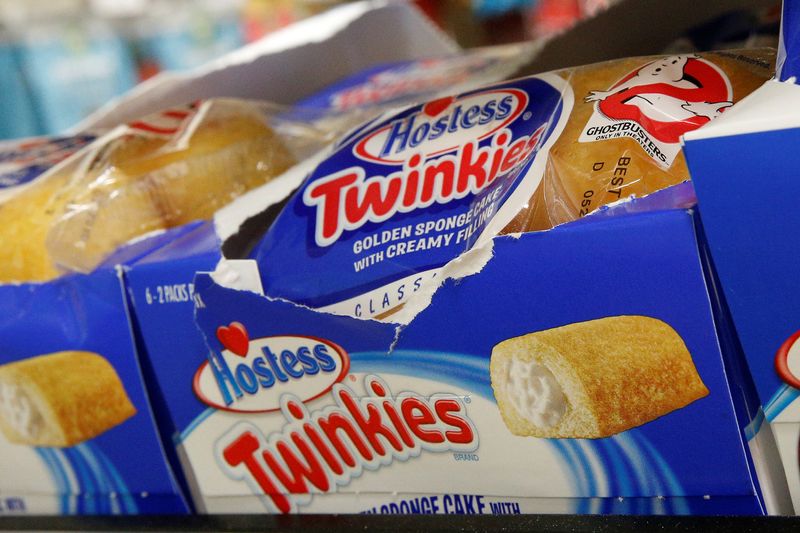By Anirban Sen, Greg Roumeliotis and Ananya Mariam Rajesh
(Reuters) -J.M. Smucker on Monday agreed to buy Twinkies maker Hostess Brands (NASDAQ:TWNK) for $5.6 billion including debt in a deal that unites two major American snack makers.
The deal was worth about $4.6 billion excluding debt, with Jif peanut butter maker Smucker paying Hostess shareholders $34.25 per share. The cash-and-stock offer represents a premium of 54% on the stock since the day Reuters reported the company was exploring a sale.
Hostess shares have surged 27% since the report about the sale process and were up 19% at $33.49 in early trading on Monday, while Smucker's shares were down 7% as investors viewed the deal as too expensive.
Smucker said the deal, which is expected to close in the third quarter of its current fiscal year, represents adjusted earnings before interest, taxes, depreciation, and amortization (EBITDA) of about 17.2 times based on its estimate of Hostess Brands' 2023 results.
Campbell Soup (NYSE:CPB)'s recent acquisition of Rao's sauce maker Sovos Brands represented an adjusted EBITDA multiple of 14.6 times, including run rate savings, and 19.8 times excluding those. The food and tobacco sector currently trades at a 14.4 projected 12-month EBITDA on average, LSEG data shows.
"We can’t say we love this transaction from SJM’s perspective. First, the price is high; we are very surprised that SJM (or anyone) is paying this amount," JPMorgan analysts said in a note on Monday.
Smucker's bet on Hostess comes as major U.S. packaged food companies look to expand their brand portfolios with pandemic-era fortunes dwindling.
In recent months, the U.S. packaged food industry has seen an uptick in mergers as most of the companies seek to improve volumes by rebranding portfolios after benefits from price hikes started wavering.
CULMINATION OF TURNAROUND
Hostess Brands became an acquisition target after its price hikes boosted revenue but fueled investor concerns over its prospects with its volume growth consistently declining.
The tie-up between Smucker and Hostess follows a spate of other deals in the sector, including Campbell Soup's $2.7 billion deal for Sovos Brands and Unilever (LON:ULVR)'s purchase of premium frozen yogurt brand Yasso in North America.
Based in Lenexa, Kansas, Hostess was founded in 1930 and is behind several iconic household brands, including Ho-Hos, Ding Dongs, Zingers, and Voortman cookies and wafers.
The deal with Smucker represents a major turnaround for Hostess, which has filed for bankruptcy twice, in 2004 and 2012, due to a combination of private equity owners saddling it with debt and failing to come up with new snacks that appealed to consumers.
Entrepreneur Dean Metropoulos and private equity firm Apollo Global Management (NYSE:APO) Inc returned Hostess to the stock market in 2016 through a deal with a special purpose acquisition company backed by the private equity firm founded by Alec Gores.

By the end of 2020, Hostess had revamped its portfolio and was generating revenue of over $1 billion, an important landmark in its turnaround efforts. It has managed to keep its revenue growing, sometimes by raising prices as sales volumes weakened.
Smucker, which also houses coffee and pet food brands, has a market valuation of over $14 billion and had raised prices of its jams and jellies, which helped boost its profit forecast for the year.